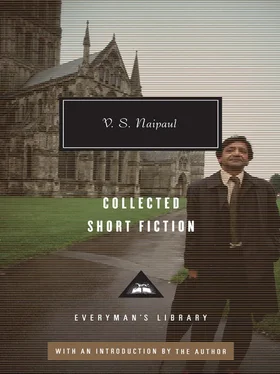The tramp, when he appeared on the quay, looked very English; but that might only have been because we had no English people on board. From a distance he didn’t look like a tramp. The hat and the rucksack, the lovat tweed jacket, the grey flannels and the boots might have belonged to a romantic wanderer of an earlier generation; in that rucksack there might have been a book of verse, a journal, the beginnings of a novel.
He was slender, of medium height, and he moved from the knees down, with short springy steps, each foot lifted high off the ground. It was a stylish walk, as stylish as his polka-dotted saffron neck-scarf. But when he came nearer we saw that all his clothes were in ruin, that the knot on his scarf was tight and grimy; that he was a tramp. When he came to the foot of the gangway he took off his hat, and we saw that he was an old man, with a tremulous worn face and wet blue eyes.
He looked up and saw us, his audience. He raced up the gangway, not using the hand-ropes. Vanity! He showed his ticket to the surly Greek; and then, not looking about him, asking no questions, he continued to move briskly, as though he knew his way around the ship. He turned into a passageway that led nowhere. With comical abruptness he swung right round on one heel and brought his foot down hard.
‘Purser,’ he said to the deck-boards, as though he had just remembered something. ‘I’ll go and see the purser.’
And so he picked his way to his cabin and bunk.
Our sailing was delayed. While their places in the smoking-room were being watched over, some of the American schoolchildren had gone ashore to buy food; we were waiting for them to come back. As soon as they did — no giggles: the girls were plain, pale and abashed — the Greeks became especially furious and rushed. The Greek language grated like the anchor chain. Water began to separate us from the quay and we could see, not far from where we had been, the great black hulk of the liner Leonardo da Vinci , just docked.
The tramp reappeared. He was without his hat and rucksack and looked less nervous. Hands in trouser pockets already stuffed and bulging, legs apart, he stood on the narrow deck like an experienced sea-traveller exposing himself to the first sea breeze of a real cruise. He was also assessing the passengers; he was looking for company. He ignored people who stared at him; when others, responding to his own stare, turned to look at him he swivelled his head away.
In the end he went and stood beside a tall blond young man. His instinct had guided him well. The man he had chosen was a Yugoslav who, until the day before, had never been out of Yugoslavia. The Yugoslav was willing to listen. He was baffled by the tramp’s accent but he smiled encouragingly; and the tramp spoke on.
‘I’ve been to Egypt six or seven times. Gone around the world about a dozen times. Australia, Canada, all those countries. Geologist, or used to be. First went to Canada in 1923. Been there about eight times now. I’ve been travelling for thirty-eight years. Youth-hostelling, that’s how I do it. Not a thing to be despised. New Zealand, have you been there? I went there in 1934. Between you and me, they’re a cut above the Australians. But what’s nationality these days? I myself, I think of myself as a citizen of the world.’
His speech was like this, full of dates, places and numbers, with sometimes a simple opinion drawn from another life. But it was mechanical, without conviction; even the vanity made no impression; those quivering wet eyes remained distant.
The Yugoslav smiled and made interjections. The tramp neither saw nor heard. He couldn’t manage a conversation; he wasn’t looking for conversation; he didn’t even require an audience. It was as though, over the years, he had developed this way of swiftly explaining himself to himself, reducing his life to names and numbers. When the names and numbers had been recited he had no more to say. Then he just stood beside the Yugoslav. Even before we had lost sight of Piraeus and the Leonardo da Vinci the tramp had exhausted that relationship. He hadn’t wanted company; he wanted only the camouflage and protection of company. The tramp knew he was odd.
At lunch I sat with two Lebanese. They were both overnight passengers from Italy and were quick to explain that it was luggage, not money, that had prevented them travelling by air. They looked a good deal less unhappy with the ship than they said they were. They spoke in a mixture of French, English and Arabic and were exciting and impressing each other with talk of the money other people, mainly Lebanese, were making in this or that unlikely thing.
They were both under forty. One was pink, plump and casually dressed, with a canary pullover; his business in Beirut was, literally, money. The other Lebanese was dark, well-built, with moustached Mediterranean good looks, and wore a three-piece check suit. He made reproduction furniture in Cairo and he said that business was bad since the Europeans had left. Commerce and culture had vanished from Egypt; there was no great demand among the natives for reproduction furniture; and there was growing prejudice against Lebanese like himself. But I couldn’t believe in his gloom. While he was talking to us he was winking at one of the Spanish dancers.
At the other end of the room a fat Egyptian student with thick-lensed glasses was being raucous in German and Arabic. The German couple at his table were laughing. Now the Egyptian began to sing an Arabic song.
The man from Beirut said in his American accent, ‘You should go modern.’
‘Never,’ the furniture-maker said. ‘I will leave Egypt first. I will close my factory. It is a horror, the modern style. It is grotesque, totally grotesque. Mais le style Louis Seize, ah, voilà l’âme —’ He broke off to applaud the Egyptian and to shout his congratulations in Arabic. Wearily then, but without malice, he said under his breath, ‘Ah, these natives.’ He pushed his plate from him, sank in his chair, beat his fingers on the dirty tablecloth. He winked at the dancer and the tips of his moustache flicked upwards.
The steward came to clear away. I was eating, but my plate went as well.
‘You were dining, monsieur?’ the furniture-maker said. ‘You must be calme . We must all be calme. ’
Then he raised his eyebrows and rolled his eyes. There was something he wanted us to look at.
It was the tramp, standing in the doorway, surveying the room. Such was the way he held himself that even now, at the first glance, his clothes seemed whole. He came to the cleared table next to ours, sat on a chair and shifted about in it until he was settled. Then he leaned right back, his arms on the rests, like the head of a household at the head of his table, like a cruise-passenger waiting to be served. He sighed and moved his jaws, testing his teeth. His jacket was in an appalling state. The pockets bulged; the flaps were fastened with safety pins.
The furniture-maker said something in Arabic and the man from Beirut laughed. The steward shooed us away and we followed the Spanish girls to the windy little bar for coffee.
Later that afternoon, looking for privacy, I climbed some steep steps to the open railed area above the cabins. The tramp was standing there alone, stained trouser-legs swollen, turn-ups shredded, exposed to the cold wind and the smuts from the smokestack. He held what looked like a little prayer-book. He was moving his lips and closing and opening his eyes, like a man praying hard. How fragile that face was, worked over by distress; how frail that neck, below the tight knot of the polka-dotted scarf. The flesh around his eyes seemed especially soft; he looked close to tears. It was strange. He looked for company but needed solitude; he looked for attention, and at the same time wanted not to be noticed.
Читать дальше









